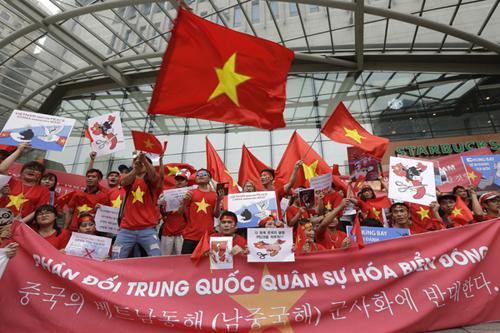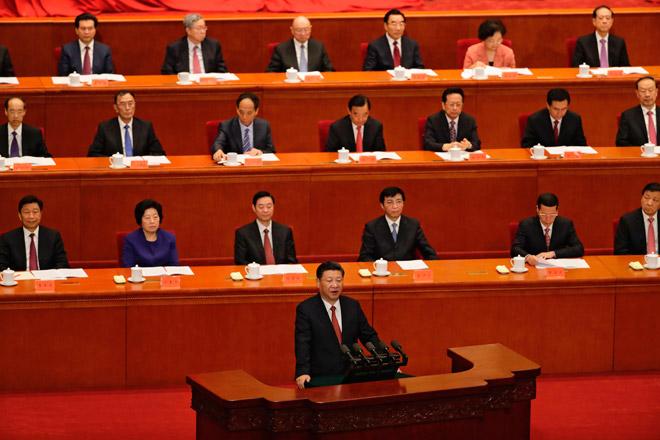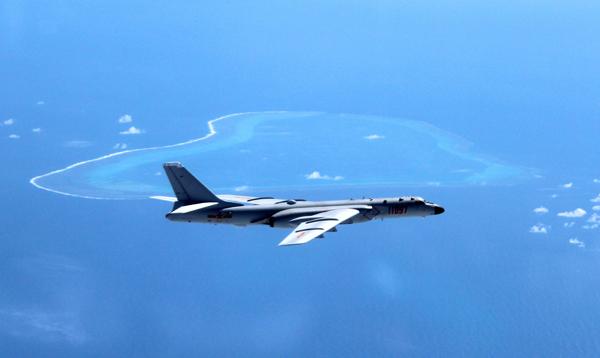You are here
ASEAN deadlocked on South China Sea, Cambodia blocks statement
By Reuters - Jul 24,2016 - Last updated at Jul 24,2016

Vietnamese protesters hold their national flags, anti-China placards and a banner that reads: ‘We oppose China because they escalate tensions on the waters of the South China Sea’ during a rally against China near the Chinese embassy in Seoul, South Korea, Sunday (AP photo)
VIENTIANE — Southeast Asian nations failed to agree on maritime disputes in the South China Sea on Sunday after Cambodia blocked any mention to an international court ruling against Beijing in their statement, diplomats said.
Foreign ministers from the 10-member Association of Southeast Asian Nations (ASEAN) met for the first time since the UN-backed Permanent Court of Arbitration handed an emphatic legal victory to the Philippines in the dispute this month.
The ruling by the court in The Hague denied China's sweeping claims in the strategic seaway, through which more than $5 trillion in global trade passes each year.
China claims most of the sea, but ASEAN members the Philippines, Vietnam, Malaysia and Brunei all have rival claims. Beijing says the ruling has no bearing on its rights in the sea, and described the case as a farce.
The Philippines and Vietnam both wanted the communique issued by ASEAN foreign ministers after their meeting to refer to the ruling and the need to respect international law, ASEAN diplomats said. Their foreign ministers both discussed the ruling with ASEAN counterparts in the Laotian capital.
But before the meeting, China's closest ASEAN ally Cambodia opposed the proposed wording, throwing the group into disarray. Phnom Penh supports Beijing's opposition to any ASEAN stand on the South China Sea, and its preference for dealing with the disputed claims on a bilateral basis.
First deadlock
since 2012
"We are still working on it," Indonesia's Foreign Minister Retno Marsudi told Reuters after the meeting on Sunday, adding that she hoped the ASEAN members would reach an agreement.
Cambodia's Foreign Minister Prak Sokhon declined to comment on his country's position on Sunday.
Even after a late-night meeting of foreign ministers called to thrash out the issue late on Saturday, the region's top diplomats were unable to find a compromise.
The group has given itself until Tuesday to come to issue a statement, said one ASEAN diplomat.
ASEAN is facing the prospect of being unable to issue a statement after a meeting for only the second time in its 49-year history. The first time, in 2012, was also due to Cambodia's resistance to language about the South China Sea.
"We have been here before and I hope they can solve it," said one official from the ASEAN Secretariat in Indonesia. "It is the same story again, a repeat of the meeting in 2012."
Over the next two days, Southeast Asian nations will meet with China's Foreign Minister Wang Yi and US Secretary of State John Kerry. Kerry and Wang are also expected to meet and discuss the maritime issues.
Wang, who started bilateral meetings with ASEAN members on Sunday, said he thought the media focus on the South China Sea issue was "very strange".
It was "not a China-ASEAN issue", he said, adding that disputes should be resolved among the parties involved.
Japan's Foreign Minister Fumiko Kishida will also be in Laos for the ASEAN regional forum meeting. It is unclear if he will meet Wang, but China reacted angrily to Kishida saying he would discuss the sea issue if they do meet.
China's Foreign Ministry spokesman Lu Kang, in a statement posted on the ministry's website, said the sea is not Japan's concern.
"We urge Japan not to hype up and meddle in the South China Sea issue," he said. "Japan is not a concerned party in the South China Sea, and because of its disgraceful history is in no place to make irresponsible comments about China."
US role
The United States, allied with the Philippines and cultivating closer relations with Vietnam, has called on China to respect the court's ruling.
It has criticised China's building of artificial islands and facilities in the sea and has sailed warships close to the disputed territory to assert freedom of navigation rights.
But Kerry will urge ASEAN nations to explore diplomatic ways to ease tension over Asia's biggest potential military flashpoint, a senior US official said ahead of his trip.
Chinese state media called for "damage control" at the meetings. A commentary published by the official Xinhua news agency on Sunday said the court ruling was a "blow to peace and stability in the region... and only serves to increase the likelihood of confrontation and turbulence”.
Barack Obama is set in September to become the first US president to visit Laos, attending an annual summit hosted by the country that holds the ASEAN chairmanship.
Nobel laureate Aung San Suu Kyi is also in Laos, making her debut at ASEAN meetings as the foreign minister for Myanmar.
Related Articles
VIENTIANE, Laos — China scored an unequivocal diplomatic victory Monday, preventing Southeast Asia's main grouping from criticising it for t
MANILA — Southeast Asian ministers meeting this week are set to avoid tackling the subject of Beijing's arming and building of manmade South
VIENTIANE — Beijing came under pressure at an Asian summit Wednesday over its "illegal" island building in the South China Sea, after the Ph














